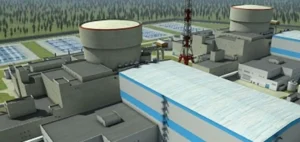A leak presented as not serious was declared during a hydraulic test on a reactor of the nuclear power station of Civaux (Vienne), currently stopped, confirmed Tuesday EDF, without saying if the incident will delay its restarting this winter.
This was revealed in the press, while a meeting of the local information commission on the site is to be held in the afternoon.
The group gave no indication of the time required for the repair, nor of a possible postponement of the return to operation of the affected reactor, scheduled for January 8.
It is “far too early” to say that the timetable will be shifted, said Régis Clément, deputy director of the group’s Nuclear Generation Division, during a press briefing on the “stress corrosion” phenomenon affecting EDF reactors, including those at Civaux.
The incident that occurred on November 2 has nothing to do with this problem, according to the leader: “it is absolutely not a weld that broke”, he said.
The two reactors of the Vienne power plant are the most recent and most powerful of the French fleet at the moment, with a power of 1.45 GW each. The leak concerns the number one reactor, launched in December 1997 and shut down since August 2021.
It occurred during a “hydraulic test” to check the tightness of the “primary circuit” (the one that cools the reactor core) as part of a “regulatory control” carried out “every ten years”, in the absence of nuclear fuel in the tank, said Clement.
A specific device for this test did not resist the increase in pressure and its rupture, the first of its kind according to EDF, caused a jet of steam, which flooded a room by turning into water.
The leak is of the order of 1.5 cubic meters per hour and “80 m3 of effluent” have been recovered, according to the group’s manager.
The latter must now bring a robot into the room to recover a metal element, ejected during the incident and radioactive.
“There is no risk to the environment, nor to public health,” assured the deputy director general of the Institute for Radiation Protection and Nuclear Safety (IRSN), Karine Herviou, on franceinfo.
Once the repair is done, “the interrupted requalification test will have to be resumed,” a spokeswoman for the Nuclear Safety Authority told AFP.
Stress corrosion repairs have been completed on Civaux 1. They are underway on reactor No. 2, which is scheduled to restart on January 14.





















